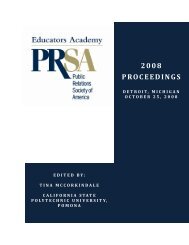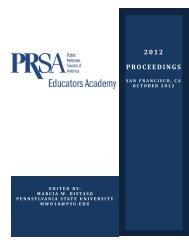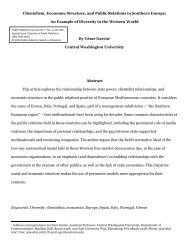2010 - Public Relations Society of America
2010 - Public Relations Society of America
2010 - Public Relations Society of America
Create successful ePaper yourself
Turn your PDF publications into a flip-book with our unique Google optimized e-Paper software.
---------------------------------<br />
Insert Table 2 about here<br />
---------------------------------<br />
Media Use Before Crises<br />
Before addressing why publics seek out social and older media for crisis information, we<br />
first asked why participants use social and traditional media regularly to compare to use during<br />
crises. Participants use social media regularly for four main reasons: entertainment, relationship<br />
maintenance, networking, and education. In addition, participants used older media on a daily<br />
basis for education and entertainment. All participants emphasized that they use social media for<br />
entertainment and relationship maintenance purposes. For example, a participant noted, “For<br />
social media, my main purpose for using it is to stay in contact with people,” and another<br />
observed, “Entertainment value is really the root reason I use social media.” Related to<br />
relationship maintenance, five participants also mentioned using social media for pr<strong>of</strong>essional<br />
networking. For example, one participant stated: “I will look at their Twitter feeds because a lot<br />
<strong>of</strong> times they will put up postings, like ‘If you’re interested in this, contact this person,’ and<br />
that’s kind <strong>of</strong> a good way to start networking.” Seven participants mentioned using social media<br />
for educational purposes. For example, a participant stated: “Sometimes Facebook is the quickest<br />
news source because everybody’s posting about the most recent thing that’s important to<br />
everyone, so sometimes I’ll find out about it there and then go read the story on a news website.”<br />
Participants primarily use older media for education. For example, one participant said:<br />
“The newspapers and stuff are just for educational and so I know what’s going on in the world so<br />
I’m not just living in a bubble.” Five participants mentioned using older media for entertainment.<br />
For example, one participant noted: “There’s usually a section in the Washington Post about<br />
travel or something, and I go to D.C. a lot, so sometimes I look in there for good places to go.<br />
Also I look in the movie section just to see the reviews.”<br />
RQ1: Why, if at all, do publics seek out social or older media for crisis information?<br />
Participants explained recent crises, while researchers probed for their media use. The<br />
participants discussed 17 different crises (see Table 3), with riots after a major athletic victory<br />
and the H1N1 flu outbreak discussed most frequently. For the majority <strong>of</strong> the crises discussed,<br />
the participants remembered first hearing about them through in person word-<strong>of</strong>-mouth<br />
communication (n = 11), followed by TV news (n = 9), directly experiencing the crisis (n = 9),<br />
and Facebook (n = 7). Less common media for first finding out about crises were text<br />
messages (n = 4), email (n = 2), and radio, blogs, and news magazines (n = 1 each).<br />
---------------------------------<br />
Insert Table 3 about here<br />
---------------------------------<br />
For all crises, the participants first looked for information about why and how the crisis<br />
occurred, followed by accountability. However, when participants were highly involved in crises<br />
they also wanted to know what response steps to take. In other words, participants affirmatively<br />
answering that crises personally affected them wanted to know information such as where to get<br />
an H1N1 flu shot, how to repair their recalled Toyota, and how to prepare for the blizzard. For<br />
example, one participant said, “I just wanted to know basically how many people had it [H1N1]<br />
and then what to do. I knew that some <strong>of</strong> my friends had it, and I was just like ‘stay away.’”<br />
Through discussing various crises, two themes emerged explaining why participants primarily<br />
use social media during crises: insider information and checking in with family/friends. In<br />
addition, one theme—education—emerged explaining why participants use older media during<br />
147
















